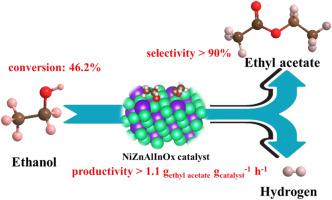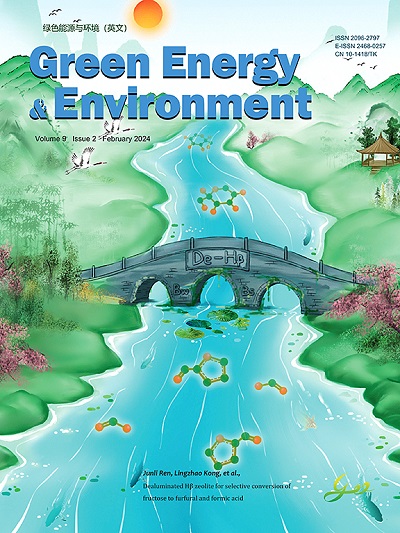用铟定制镍基催化剂,用于乙醇脱氢偶联成乙酸乙酯
IF 10.7
1区 工程技术
Q1 CHEMISTRY, PHYSICAL
引用次数: 0
摘要
寻找稳定、强大的催化剂来取代目前有毒的CuCr基催化剂用于乙醇与乙酸乙酯的脱氢偶联是一项具有挑战性但有前景的任务。在此,通过将Ni催化剂与铟(In)进行裁剪,开发了新型的NiIn基催化剂。优化后的Ni0.1Zn0.7Al0.3InOx催化剂,在548 K、质量时空速1.9 h-1的条件下,对乙酸乙酯的选择性达到90.1%,乙醇转化率为46.2%。此外,乙酸乙酯产率超过1.1乙酸乙酯gcatalyst-1 h-1,是目前研究中性能最好的产品之一。通过催化剂表征和条件实验,确定了乙醇与乙酸乙酯脱氢偶联反应的活性位点为Ni4In合金。In的存在调整了Ni的化学性质,从而抑制了乙醇转化过程中的C-C裂解和/或缩合反应。在Ni4In合金位点上,乙醇脱氢生成乙醛,然后脱除H原子转化为乙酰基。最后,乙酰基与表面丰富的乙氧基偶联生成乙酸乙酯,具有较高的乙酸乙酯选择性和催化剂稳定性。本文章由计算机程序翻译,如有差异,请以英文原文为准。

Tailoring Ni based catalysts by Indium for the dehydrogenative coupling of ethanol into ethyl acetate
Exploring stable and robust catalysts to replace the current toxic CuCr based catalysts for dehydrogenative coupling of ethanol to ethyl acetate is a challenging but promising task. Herein, novel NiIn based catalysts were developed by tailoring Ni catalysts with Indium (In) for this reaction. Over the optimal Ni0.1Zn0.7Al0.3InOx catalyst, the ethyl acetate selectivity reached 90.1% at 46.2% ethanol conversion under the conditions of 548 K and a weight hourly space velocity of 1.9 h-1 in the 370 h time on stream. Moreover, the ethyl acetate productivity surpassed 1.1 gethyl acetate gcatalyst-1 h-1, one of the best performance in current works. According to catalyst characterizations and conditional experiments, the active sites for dehydrogenative coupling of ethanol to ethyl acetate were proved to be Ni4In alloys. The presence of In tailored the chemical properties of Ni, and subsequently inhibited the C-C cracking and/or condensation reactions during ethanol conversions. Over Ni4In alloy sites, ethanol was dehydrogenated into acetaldehyde, and then transformed into acetyl species with the removal of H atoms. Finally, the coupling between acetyl species and surface-abundant ethoxyde species into ethyl acetate was achieved, affording a high ethyl acetate selectivity and catalyst stability.
求助全文
通过发布文献求助,成功后即可免费获取论文全文。
去求助
来源期刊

Green Energy & Environment
Energy-Renewable Energy, Sustainability and the Environment
CiteScore
16.80
自引率
3.80%
发文量
332
审稿时长
12 days
期刊介绍:
Green Energy & Environment (GEE) is an internationally recognized journal that undergoes a rigorous peer-review process. It focuses on interdisciplinary research related to green energy and the environment, covering a wide range of topics including biofuel and bioenergy, energy storage and networks, catalysis for sustainable processes, and materials for energy and the environment. GEE has a broad scope and encourages the submission of original and innovative research in both fundamental and engineering fields. Additionally, GEE serves as a platform for discussions, summaries, reviews, and previews of the impact of green energy on the eco-environment.
 求助内容:
求助内容: 应助结果提醒方式:
应助结果提醒方式:


